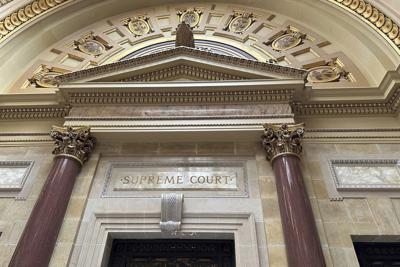MADISON, Wis. (AP) — The Wisconsin Supreme Court cleared the way Tuesday for the state to institute a ban on conversion therapy.
The court ruled that a Republican-controlled legislative committee’s rejection of a state agency rule that would ban the practice of conversion therapy for LGBTQ+ people was unconstitutional.
The 4-3 ruling from the liberal-controlled court comes amid the national battle over LGBTQ+ rights. It is also part of a broader effort by the Democratic governor, who has vetoed Republican bills targeting transgender high school athletes, to rein in the power of the GOP-controlled Legislature.
What is conversion therapy?
What is known as conversion therapy is the scientifically discredited practice of using therapy to “convert” LGBTQ+ people to heterosexuality or traditional gender expectations.
The practice has been banned in 23 states and the District of Columbia, according to the Movement Advancement Project, an LGBTQ+ rights think tank. It is also banned in more than a dozen communities across Wisconsin. Since April 2024, the Wisconsin professional licensing board for therapists, counselors and social workers has labeled conversion therapy as unprofessional conduct.
Advocates seeking to ban the practice want to forbid mental health professionals in the state from counseling clients with the goal of changing their sexual orientation or gender identity.
The U.S. Supreme Court agreed in March to hear a Colorado case about whether state and local governments can enforce laws banning conversion therapy for LGBTQ+ children.
What is happening in Wisconsin?
The provision barring conversion therapy in Wisconsin has been blocked twice by the Legislature’s powerful Joint Committee for the Review of Administrative Rules — a Republican-controlled panel in charge of approving state agency regulations.
The Wisconsin Supreme Court ruling means the conversion therapy ban can be enacted. The court ruled that the legislative committee has been overreaching its authority in blocking a variety of other state regulations during Democratic Gov. Tony Evers’ administration.
The lawsuit brought by Evers targeted two votes by the joint committee. One deals with the Department of Safety and Professional Services’ conversion therapy ban. The other vote blocked an update to the state’s commercial building standards.
Republicans who supported suspending the conversion therapy ban have insisted the issue isn’t the policy itself, but whether the licensing board had the authority to take the action it did.
Evers has been trying since 2020 to get the ban enacted, but the Legislature has stopped it from going into effect.
Legislative power at stake
The Legislature’s attorney argued that decades of precedent backed up their argument, including a 1992 Wisconsin Supreme Court ruling upholding the Legislature’s right to suspend state agency rules. Overturning that ruling would be deeply disruptive, attorney Misha Tseytlin argued.
Evers argued that by blocking the rule, the legislative committee is taking over powers that the state constitution assigns to the governor. The 1992 ruling conflicts with the constitution and has “proved unworkable,” Evers said.
The Supreme Court on Tuesday agreed with Evers.
The issue goes beyond conversion therapy
The conversion therapy ban is one of several rules that have been blocked by the legislative committee. Others pertain to environmental regulations, vaccine requirements and public health protections.
Evers argued in the lawsuit that the panel has effectively been exercising an unconstitutional “legislative veto.”



